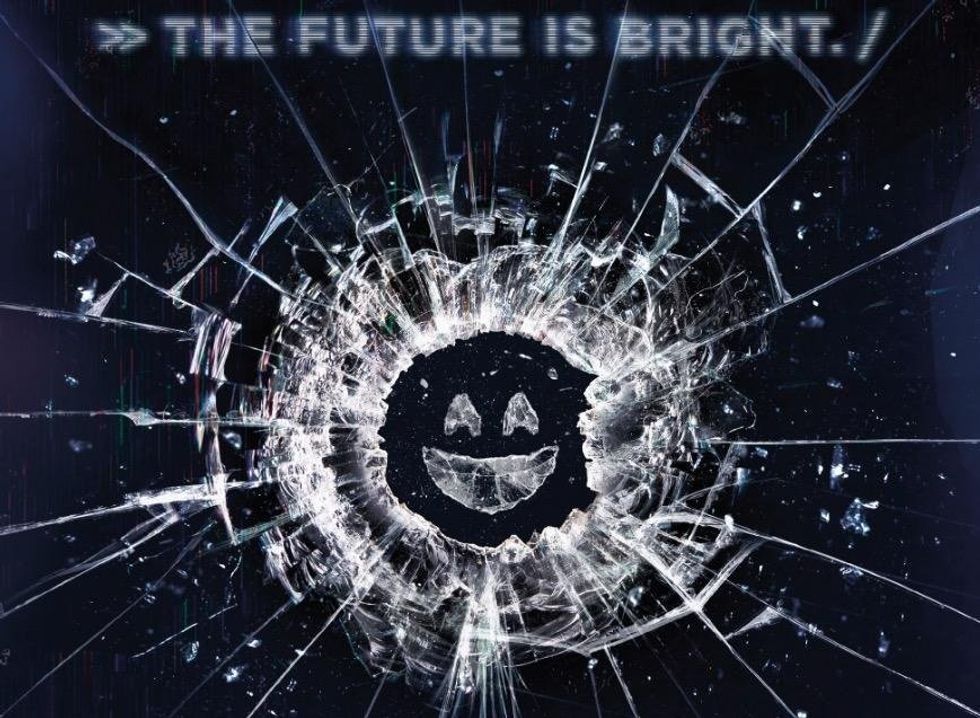It started with a heart-shaped face walking through a diner, phone in hand, surrounded by many more people with their phones in hand as well. The setting opened up quietly; not much discourse taking place, if any at all, and when Lacie Pound looked up from her phone... she saw numbers above everyone's head. Those numbers were their ratings-- the higher the rating, the higher the social status. From first glance it's very standard people-watching drama; some character attempts to climb the social ladder that clearly exists for an unknown reason (because we're all just people trying to survive each day, right?) As with every other Black Mirror episode, there's more to it than you're shouting at the television.
Lacie quickly finds herself climbing the ladder as she's invited to a socialite's wedding, a girl that used to be some kind of friend in school. After an argument with her brother, whom luckily seems to be the only person with a grip on reality in this virtual world, she plummets to the bottom of the pool with a cement block tied to her ankle. Still, she fights to attend the wedding to prove that she is worth amazing rates. Oh, side bar-- you have the power to rate someone and that judgment affects their overall rating. Pick up your phone right now and open up Instagram or Facebook, say it's not the same exact thing.
Scary, right? Lacie's story, Nosedive, is one of many in this short three season series that is capable of standing on its own. No plot line is connected, no actors or actresses are related. The idea of rating each other is comical, we do it every day. Lacie seemed quite foolish to me to care so much, but I truly felt empathetic toward the girl. Perhaps because I've been there, I've felt that pressure to appear "put together" on my social media page because I knew everyone was watching.
Other episodes maintain Lacie Pound's light-hearted, hope for the future atmosphere, while others take darker turns than you are prepared for. Shut Up and Dance is an episode about a normal teenage boy staying home alone with his sister one evening. When his computer is infected with a virus, not only is the laptop at risk, but so is he. Watching this episode leaves one embracing insanity because you need to understand what will push someone to do just about anything, but you never get the answers you want--until the final second. In another episode, Playtest, an American traveler shoves some clothes into a backpack and leaves for Europe. Obviously he runs low on cash quickly and finds an app that leads him to an exciting get-rich-quick outlet. In a mind blowing fourth of a second, we feel this traveler's fears and anxieties without his permission; and without our own.
One has to wonder how creator Charlie Brooker has such an eerie grip on this generation's not-so-distant future. Technology not only stays vastly important to the world, but it advances in ways that have been closely predicted by now; that's the terrifying part. Each setting is not so different from today's reality other than a newly advanced piece of technology thrown into the equation. Every stone is left unturned at the end of each episode, and you're afraid to peek but you need to know what's under that rock. Brooker lays out a mental board game where the viewer can never be the winner. The attachment to each story hurts the most because, at some point, you have found yourself in their shoes. You have found yourself nosing around in places you don't belong, you have hidden parts of yourself that no one should know exist, you have judged someone through a clouded lens.
There's no right or wrong way to watch Black Mirror, enjoy any episode at your leisure, but prepare to ache, be angry or confused. Black Mirror earns its title in a technologically sophisticated manner; the high tech equipment we're creating may empower us daily, but the darkness of technology can be seen when the screen goes black.





















